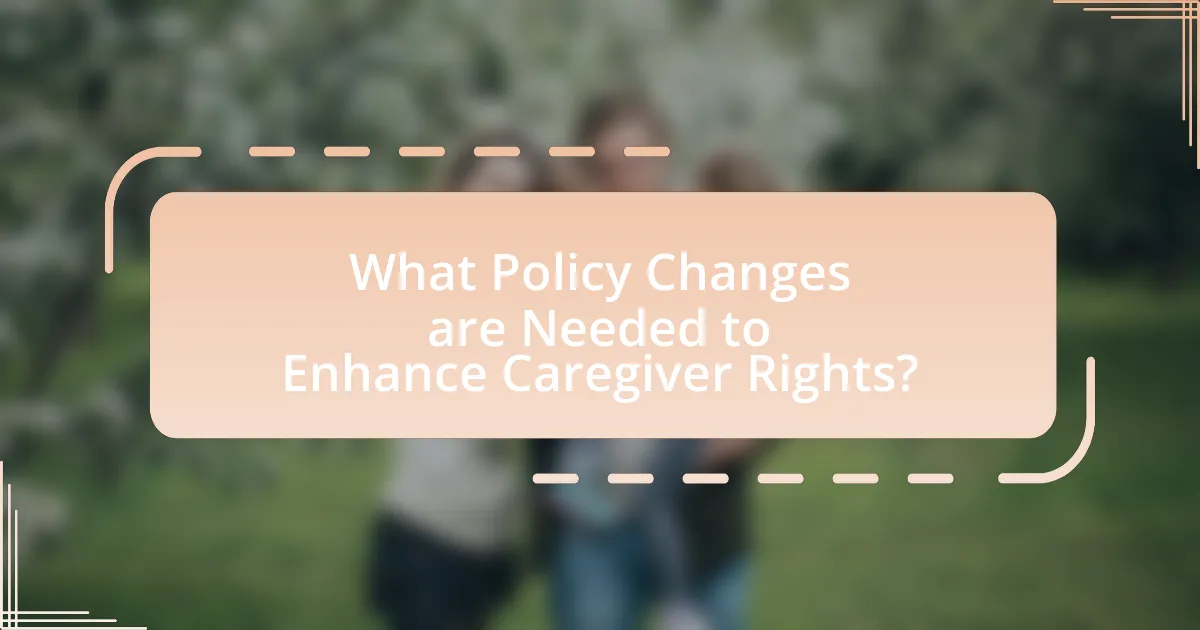The article focuses on advocating for policy changes to improve caregiver rights, emphasizing the legal and ethical entitlements of individuals providing care to family members or friends. It outlines the importance of caregiver rights in ensuring fair treatment, access to resources, and support, which ultimately enhances the quality of care provided. Key topics include the specific rights caregivers should possess, the challenges they face in asserting these rights, and the varying legal frameworks across different regions. The article also highlights the role of advocacy in driving policy changes, the impact of societal perceptions on caregiver recognition, and the necessary steps for stakeholders to collaborate effectively in promoting caregiver rights.

What are Caregiver Rights and Why are They Important?
Caregiver rights refer to the legal and ethical entitlements that individuals providing care to others, often family members or friends, possess. These rights are important because they ensure caregivers receive necessary support, protection from discrimination, and access to resources that enable them to perform their caregiving duties effectively. For instance, the Family and Medical Leave Act (FMLA) in the United States provides eligible caregivers with the right to take unpaid leave to care for a family member without fear of losing their job. This legal framework underscores the significance of caregiver rights in promoting the well-being of both caregivers and those they care for, ultimately fostering a more supportive environment for caregiving.
How do caregiver rights impact the quality of care provided?
Caregiver rights significantly enhance the quality of care provided by ensuring that caregivers are treated fairly and have access to necessary resources. When caregivers are granted rights such as fair compensation, adequate training, and support, they are more likely to deliver high-quality care, as they feel valued and empowered in their roles. Research indicates that when caregivers experience job satisfaction and reduced stress, the care recipients benefit from improved emotional and physical health outcomes. For instance, a study published in the Journal of Aging and Social Policy found that caregivers who received adequate support reported higher levels of well-being, which directly correlated with better care for their clients. Thus, the recognition and enforcement of caregiver rights are crucial for fostering an environment that promotes optimal care quality.
What specific rights should caregivers have to ensure effective care?
Caregivers should have specific rights that include the right to fair compensation, access to training and resources, and the right to a safe working environment. Fair compensation ensures that caregivers are financially supported for their essential work, which is critical given that, according to the Bureau of Labor Statistics, the median annual wage for home health aides was $29,640 in 2020. Access to training and resources enables caregivers to provide high-quality care, as studies show that well-trained caregivers can significantly improve patient outcomes. The right to a safe working environment is essential, as caregivers often face physical and emotional challenges; the Occupational Safety and Health Administration emphasizes that safe workplaces reduce injury rates and improve job satisfaction. These rights collectively empower caregivers to deliver effective care while ensuring their well-being.
How do caregiver rights vary across different regions or countries?
Caregiver rights significantly vary across different regions and countries, influenced by local laws, cultural norms, and social policies. For instance, in the United States, the Family and Medical Leave Act allows eligible employees to take unpaid leave for family caregiving, while in countries like Sweden, caregivers benefit from comprehensive support systems, including paid leave and financial assistance. Additionally, some countries, such as Japan, have enacted specific laws to protect caregivers’ rights, ensuring access to training and respite care. These differences highlight the diverse approaches to caregiver support, reflecting varying societal values and government priorities regarding family caregiving responsibilities.
What challenges do caregivers face in asserting their rights?
Caregivers face significant challenges in asserting their rights, primarily due to a lack of awareness about their legal entitlements and insufficient support systems. Many caregivers are unaware of the specific rights afforded to them under laws such as the Family and Medical Leave Act, which can lead to underutilization of available benefits. Additionally, caregivers often experience emotional and physical exhaustion, which can hinder their ability to advocate for themselves effectively. Research indicates that approximately 60% of caregivers report feeling overwhelmed, which can diminish their capacity to navigate complex legal and bureaucratic systems. Furthermore, societal stigma and the perception that caregiving is a personal responsibility can discourage caregivers from seeking assistance or asserting their rights.
What legal barriers exist that hinder caregiver rights?
Legal barriers that hinder caregiver rights include a lack of formal recognition of caregivers in labor laws, insufficient access to paid family leave, and inadequate protections against discrimination. Many jurisdictions do not classify caregivers as employees, which limits their access to benefits such as health insurance and job security. For instance, the Family and Medical Leave Act (FMLA) in the United States provides limited unpaid leave and does not cover all caregivers, leaving many without necessary support. Additionally, caregivers often face challenges in accessing resources and support services due to bureaucratic hurdles and a lack of funding for caregiver programs. These barriers contribute to the marginalization of caregivers and hinder their ability to advocate for their rights effectively.
How do societal perceptions affect the recognition of caregiver rights?
Societal perceptions significantly influence the recognition of caregiver rights by shaping public attitudes and policy priorities. When society views caregiving as a noble and essential role, it often leads to increased advocacy for caregiver rights, resulting in better support systems and legal protections. Conversely, if caregiving is perceived as a private responsibility or undervalued, this can hinder the acknowledgment of caregivers’ needs and rights, leading to inadequate policies and resources. For instance, research by the National Alliance for Caregiving indicates that positive societal recognition of caregivers correlates with legislative efforts to enhance their rights and benefits, demonstrating the direct impact of societal attitudes on policy outcomes.

What is the Role of Advocacy in Improving Caregiver Rights?
Advocacy plays a crucial role in improving caregiver rights by influencing policy changes that enhance protections and support for caregivers. Through organized efforts, advocacy groups raise awareness about the challenges caregivers face, such as lack of financial compensation, inadequate training, and insufficient access to resources. For instance, the National Family Caregivers Association has successfully lobbied for legislation that provides tax credits and respite care services, demonstrating the tangible impact of advocacy on caregiver rights. By mobilizing public support and engaging with lawmakers, advocacy initiatives create a framework for systemic change that benefits caregivers and acknowledges their essential contributions to society.
How can advocacy lead to meaningful policy changes for caregivers?
Advocacy can lead to meaningful policy changes for caregivers by mobilizing public support and influencing decision-makers to recognize and address caregivers’ needs. Through organized campaigns, caregivers and their advocates can highlight issues such as inadequate support, lack of resources, and the need for legal protections, which can prompt lawmakers to introduce or amend legislation. For instance, the National Family Caregivers Association successfully advocated for the Caregiver Support Program, which provides funding for caregiver services, demonstrating how targeted advocacy can result in tangible policy outcomes that improve the lives of caregivers.
What strategies have proven effective in advocating for caregiver rights?
Effective strategies for advocating for caregiver rights include grassroots mobilization, coalition building, and legislative lobbying. Grassroots mobilization empowers caregivers by organizing them to share their experiences and needs, which can influence public opinion and policy. Coalition building involves forming alliances with other organizations and stakeholders to amplify the caregiver voice and create a united front for advocacy efforts. Legislative lobbying focuses on directly engaging with policymakers to promote specific laws and regulations that protect caregiver rights, such as paid family leave and access to resources. These strategies have been validated by successful campaigns that have led to significant policy changes, demonstrating their effectiveness in improving caregiver rights.
How can caregivers themselves participate in advocacy efforts?
Caregivers can participate in advocacy efforts by joining or forming support groups that focus on caregiver rights and policy changes. These groups can amplify their voices, allowing caregivers to share experiences and collectively push for legislative reforms. For instance, the National Family Caregivers Association has successfully mobilized caregivers to advocate for policy changes at local and national levels, demonstrating the effectiveness of organized efforts. Additionally, caregivers can engage in direct communication with lawmakers, providing personal testimonies that highlight the challenges they face, which can influence policy decisions.
What organizations are leading the charge for caregiver rights?
The organizations leading the charge for caregiver rights include the National Family Caregivers Association (NFCA), the Family Caregiver Alliance (FCA), and AARP. The NFCA advocates for policies that support family caregivers through education and resources, while the FCA focuses on improving the quality of life for caregivers and their families by providing support services and advocating for policy changes. AARP also plays a significant role in advocating for caregiver rights, emphasizing the need for legislative reforms to support caregivers financially and emotionally. These organizations collectively work to raise awareness and influence policy to enhance the rights and support available to caregivers.
What resources do these organizations provide to support caregivers?
Organizations that advocate for caregiver rights provide various resources to support caregivers, including educational materials, training programs, financial assistance, and access to support groups. For instance, the Family Caregiver Alliance offers online resources that include fact sheets, webinars, and a caregiver support program designed to help individuals navigate caregiving challenges. Additionally, the National Alliance for Caregiving provides research reports and toolkits that equip caregivers with essential information and strategies for effective caregiving. These resources are crucial for enhancing caregivers’ knowledge, skills, and emotional well-being, ultimately improving their ability to provide care.
How can caregivers connect with these organizations for assistance?
Caregivers can connect with organizations for assistance by visiting their official websites, where they often provide contact information, resources, and support services. Many organizations, such as the National Family Caregivers Association, offer dedicated hotlines and email support for caregivers seeking guidance. Additionally, caregivers can participate in local support groups or community events organized by these organizations, which facilitate networking and access to resources. Research indicates that direct engagement with these organizations significantly enhances caregivers’ access to necessary support and information, as evidenced by studies showing improved caregiver well-being through such connections.

What Policy Changes are Needed to Enhance Caregiver Rights?
To enhance caregiver rights, policy changes must include the establishment of paid family leave, improved access to healthcare benefits, and stronger protections against workplace discrimination. Paid family leave allows caregivers to take time off without financial strain, which is essential as approximately 34% of caregivers report financial hardship due to caregiving responsibilities. Improved access to healthcare benefits ensures that caregivers can maintain their own health while providing care, as studies show that caregivers often neglect their health. Additionally, stronger protections against workplace discrimination can safeguard caregivers from losing their jobs or facing retaliation due to their caregiving duties, which is crucial given that nearly 60% of caregivers experience workplace challenges related to their caregiving role. These policy changes are vital for supporting the well-being and rights of caregivers.
What specific policies should be prioritized for change?
Policies that should be prioritized for change include the establishment of a national paid family leave policy, the implementation of minimum wage protections for caregivers, and the expansion of access to affordable childcare services. A national paid family leave policy would provide financial support to caregivers during critical periods, as evidenced by studies showing that such policies improve family well-being and workforce participation. Minimum wage protections for caregivers are essential, as many caregivers earn below the poverty line, which negatively impacts their quality of life and the care they provide. Expanding access to affordable childcare services would alleviate the burden on caregivers, allowing them to balance work and family responsibilities more effectively, as highlighted by research indicating that affordable childcare increases workforce participation among caregivers.
How can policy changes improve the working conditions for caregivers?
Policy changes can improve the working conditions for caregivers by establishing better wage standards, enhancing benefits, and ensuring legal protections. For instance, implementing minimum wage laws specifically for caregivers can lead to fair compensation, as evidenced by studies showing that higher wages correlate with increased job satisfaction and retention rates among caregivers. Additionally, policies that mandate access to health benefits and paid leave can significantly reduce burnout and turnover, which are prevalent issues in the caregiving profession. Legal protections against workplace discrimination and harassment further create a safer and more supportive environment for caregivers, ultimately leading to improved care quality for those they serve.
What impact would improved policies have on the overall healthcare system?
Improved policies would enhance the overall healthcare system by increasing access to care, improving quality of services, and reducing costs. For instance, policies that support caregiver rights can lead to better support for family caregivers, which in turn reduces the burden on healthcare facilities and allows for more efficient use of resources. Research indicates that when caregivers receive adequate support, patient outcomes improve, leading to a decrease in hospital readmissions and overall healthcare expenditures. A study published in the Journal of the American Geriatrics Society found that enhanced caregiver support can lead to a 25% reduction in healthcare costs associated with chronic illness management. Thus, improved policies directly contribute to a more effective and sustainable healthcare system.
How can stakeholders collaborate to promote policy changes?
Stakeholders can collaborate to promote policy changes by forming coalitions that unite diverse interests and resources. These coalitions can leverage collective expertise and influence to advocate for specific policy reforms, such as improved caregiver rights. For instance, organizations representing caregivers, healthcare providers, and policymakers can work together to draft policy proposals, conduct research to support their initiatives, and engage in public awareness campaigns. Evidence shows that collaborative efforts, such as the Caregiver Action Network, have successfully influenced legislation by presenting unified positions and mobilizing community support, demonstrating the effectiveness of stakeholder collaboration in driving policy change.
What role do government agencies play in supporting caregiver rights?
Government agencies play a crucial role in supporting caregiver rights by establishing policies, providing resources, and enforcing regulations that protect caregivers. These agencies, such as the Department of Health and Human Services, implement programs that offer financial assistance, training, and respite care services to caregivers, thereby enhancing their ability to provide care. For instance, the National Family Caregiver Support Program, administered by state agencies, allocates funding to support caregivers through services like counseling and support groups, which directly addresses their needs and rights. Additionally, government agencies advocate for legislative changes that promote caregiver protections, such as the Family and Medical Leave Act, which allows caregivers to take unpaid leave without fear of losing their jobs.
How can community involvement strengthen advocacy efforts?
Community involvement strengthens advocacy efforts by fostering collective action and amplifying diverse voices. When individuals participate in advocacy initiatives, they create a unified front that can effectively influence policymakers. Research indicates that grassroots movements, which rely on community engagement, often achieve greater success in enacting policy changes. For example, the 2018 “March for Our Lives” movement, driven by student activism, successfully raised awareness and led to legislative discussions on gun control. This demonstrates that when communities mobilize, they can significantly impact the political landscape and drive meaningful change in caregiver rights and other policy areas.
What are the best practices for advocating for caregiver rights?
The best practices for advocating for caregiver rights include building a coalition of stakeholders, raising public awareness, and engaging in policy advocacy. Building a coalition involves uniting caregivers, organizations, and community members to create a strong voice for change, which can amplify the impact of advocacy efforts. Raising public awareness through campaigns and educational initiatives helps to highlight the challenges faced by caregivers, fostering empathy and support from the broader community. Engaging in policy advocacy means actively participating in legislative processes, such as lobbying for specific laws that protect caregiver rights, which has been shown to lead to tangible improvements in caregiver support systems. For instance, the National Alliance for Caregiving reported that states with active caregiver advocacy groups have implemented more supportive policies, demonstrating the effectiveness of these practices.
How can caregivers effectively communicate their needs to policymakers?
Caregivers can effectively communicate their needs to policymakers by utilizing clear, concise messaging that highlights specific issues and proposed solutions. This approach ensures that policymakers understand the challenges caregivers face, such as inadequate support and resources. For instance, a study by the National Alliance for Caregiving found that 61% of caregivers reported feeling overwhelmed, which underscores the urgency for policy changes. By presenting data and personal stories, caregivers can create a compelling narrative that resonates with policymakers, making it easier for them to advocate for necessary reforms.
What steps can individuals take to raise awareness about caregiver rights?
Individuals can raise awareness about caregiver rights by organizing community events and educational workshops. These initiatives can inform the public about the legal rights and challenges faced by caregivers, fostering a supportive environment. Research indicates that community engagement significantly increases awareness; for instance, a study by the National Alliance for Caregiving found that 61% of caregivers reported feeling more informed after attending local support groups. Additionally, individuals can utilize social media platforms to share informative content, personal stories, and resources related to caregiver rights, amplifying their reach and impact. Engaging with local policymakers to advocate for legislative changes also plays a crucial role in raising awareness and promoting caregiver rights.